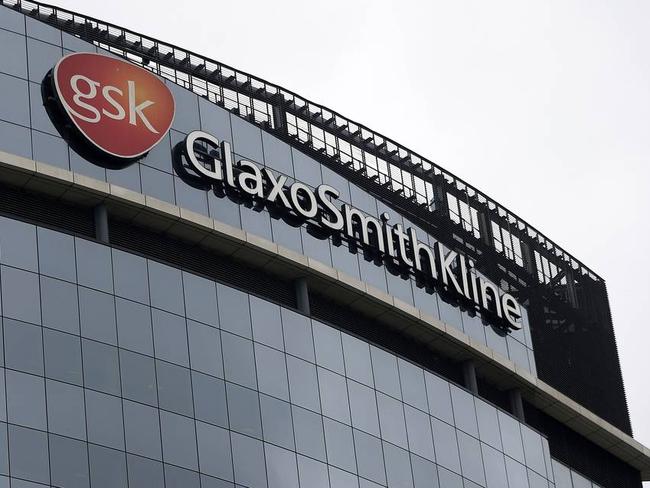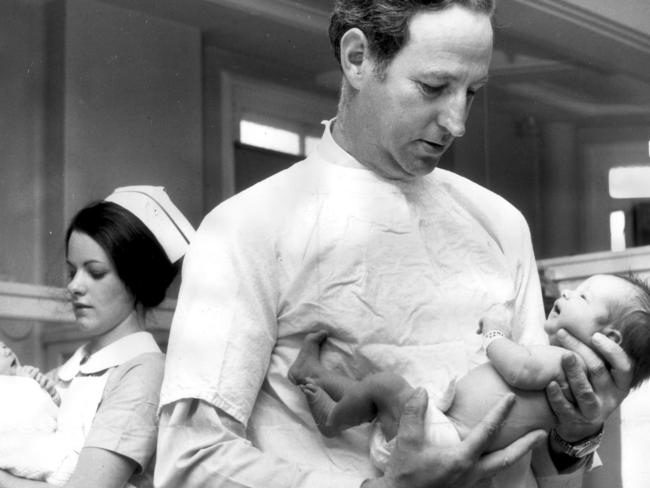Pharmaceutical giants Sanofi and GlaxoSmithKline join forces in COVID-19 race
Two of the world’s biggest pharmaceutical companies will work together to develop a coronavirus vaccine, but they’ve warned of a long wait.
Coronavirus
Don't miss out on the headlines from Coronavirus. Followed categories will be added to My News.
Pharma giants Sanofi and GlaxoSmithKline (GSK) will join forces to work on a coronavirus vaccine they hope will enter clinical trials this year, potentially making it available in the second half of 2021/
The vaccine will combine a Sanofi-developed antigen, which stimulates the production of germ-killing antibodies, with GSK’s adjuvant technology, a substance that boosts the immune response triggered by a vaccine, they said in a statement on Tuesday.
“The companies plan to initiate phase I clinical trials in the second half of 2020 and, if successful, subject to regulatory considerations, aim to complete the development required for availability by the second half of 2021,” they said.
“As the world faces this unprecedented global health crisis, it is clear that no one company can go it alone,” added Sanofi’s chief executive Paul Hudson.

Given the extraordinary humanitarian and financial toll of the pandemic, Sanofi and GSK said global access to COVID-19 vaccines was a priority.
They said they were committed to making any vaccine developed through the collaboration “affordable to the public and through mechanisms that offer fair access for people in all countries.”
Sanofi, based in Paris, said it would contribute its S-protein COVID-19 antigen, designed to exactly match proteins found on the surface of the new virus.
Britain’s GlaxoSmithKline said it would add its adjuvant, an ingredient for vaccines that can create stronger and longer-lasing immunity.
“The use of an adjuvant can be of particular importance in a pandemic situation since it may reduce the amount of vaccine protein required per dose, allowing more vaccine doses to be produced and therefore contributing to protect more people,” the statement said.
It can also improve the likelihood of delivering an effective vaccine that can be manufactured at scale.
Sanofi and GSK said their joint effort was supported by funding and a collaboration with the Biomedical Advanced Research and Development Authority (BARDA) of the US Department of Health and Human Services.
“The companies plan to discuss funding support with other governments and global institutions prioritising global access,” they added.
BARDA Director Rick Bright said the development of an adjuvanted COVID-19 vaccine promised “to end this pandemic, and help the world become better prepared or even prevent future coronavirus outbreaks.”
The coronavirus outbreak has killed more than 120,000 people worldwide since the first cases were reported in China last December.
OLD VACCINES FOR OTHER GERMS BEING TESTED AGAINST COVID-19
Scientists are dusting off some decades-old vaccines against other germs to see if they could provide a little stopgap protection against COVID-19 until a more precise shot arrives.
It may sound odd: Vaccines are designed to target a specific disease.
But vaccines made using live strains of bacteria or viruses seem to boost the immune system’s first line of defence, a more general way to guard against germs.
And history books show that sometimes translates into at least some cross-protection against other, completely different bugs.
There’s no evidence yet that the approach would rev up the immune system enough to matter against the new coronavirus.
But given that a brand-new vaccine is expected to take 12 to 18 months, some researchers say it’s time to put this approach to a faster test, starting with a tuberculosis vaccine.
“This is still a hypothesis,” said Dr. Mihai Netea of Radboud University Medical Center in the Netherlands.
But if it works, “it could be a very important tool to bridge this dangerous period until we have on the market a proper, specific vaccine.”
The World Health Organization issued a stern warning on Monday not to use the TB vaccine against COVID-19, unless and until studies prove it works.
Already nearly 1500 Dutch health care workers have rolled up their sleeves for one study that Netea’s team is leading.
It uses that TB vaccine, named BCG, which is made of a live but weakened bacterial cousin of the TB germ.
In Australia, researchers hope to enrol 4000 hospital workers to test BCG, too, and 700 already have received either the TB vaccine or a dummy shot. Similar research is being planned in other countries, including the US.
Possibly next in line: Oral polio vaccine, drops made of live but weakened polio viruses.
The Baltimore-based Global Virus Network hopes to begin similar studies with that vaccine and is in talks with health authorities, network co-founder Dr. Robert Gallo told The Associated Press.
Rapid studies are needed to tell if there could be “long-ranging effects for any second wave of this,” said Gallo, who directs the Institute of Human Virology at the University of Maryland School of Medicine.
At the US National Institutes of Health, researchers are in early discussions about proposals to study the TB and polio vaccines as a possible COVID-19 defence, said agency spokeswoman Jennifer Routh.
There’s a big caution: Live vaccines are risky for people with weakened immune systems, and shouldn’t be tried against COVID-19 outside of a research trial, said Dr. Denise Faustman, immunobiology chief at Massachusetts General Hospital, who is planning a TB vaccine study.
“You can’t just roll it out,” she stressed.
But, “it’s kind of an amazing opportunity to prove or disprove this off-target effect.”
THALIDOMIDE TESTED AS COVID-19 TREATMENT
Its name is infamous, synonymous with one of the biggest medical scandals of the twentieth century. But a group of Chinese researchers are exploring whether the drug thalidomide may have a role to play in the fight against coronavirus.
Scientists from the Wenzhou Medical University in eastern China are investigating whether the drug, which is known to cause birth defects and stillbirths, may be an effective treatment against both moderate and severe cases of COVID-19.
Up to 140 participants are taking part in two clinical studies, with half given a placebo. Those taking thalidomide will also be given a low-dose hormone treatment.
Pregnant or breastfeeding women have been excluded from the trials.

Developed in West Germany in 1957, thalidomide was marketed as a drug to ease anxiety and morning sickness during pregnancy, but it was a Sydney-based obstetrician, Dr William McBride, who first alerted the world to a possible link with birth defects in 1961.
Those abnormalities were many and varied, including underdeveloped limbs, deafness and problems with facial and eye muscles.
Submissions to an Australian Senate Inquiry into thalidomide last year stated that as many as 40 per cent of affected babies died before they reached their first year.
Thalidomide remains the “cataclysmic benchmark that health disasters all over the world are measured against,” the inquiry noted in the official report.

But thalidomide has also been used for the treatment of a range of illnesses including myeloma and leprosy.
In their clinical trial description, the Wenzhou Medical University team said thalidomide had anti-inflammatory and anti-fibrotic properties and immune regulatory effects. The drug had also been used, along with hormone therapy, to treat a type of influenza, and had achieved good results, they stated.
They estimate completing both trials by June 30.
vaccines
VACCINES TESTED ON HUMANS
The World Health Organisation has confirmed 70 COVID-19 vaccines are in development globally, as well as three candidates being tested in human trials.
Information released by WHO on Saturday shows an experimental vaccine developed by Hong Kong-listed CanSino Biologics Inc. is the furthest along in the clinical process.
It is followed by the Beijing Institute of Biotechnology, which is in phase 2.
WHO states the other two being tested on humans are treatments developed separately by U.S. drugmakers Moderna Inc. and Inovio Pharmaceuticals Inc.
With drugmakers racing to find a cure for COVID-19, progress in developing vaccines to fight the infectious pathogen is occurring at an unprecedented speed.
It comes as COVID-19 looks unlikely to be stamped out through containment measures alone.
The drug industry hopes to have a vaccine for COVID-19 on the market within the next year – a process usually taking 10 to 15 years.
According to reports, CanSino said last month it received Chinese regulatory approval to start human trials of its vaccine.
Cambridge, Massachusetts-based Moderna – which has never put out a product – received regulatory approval to move quickly to human trials in March.
Reports confirmed Inovio began its human trials last week.
